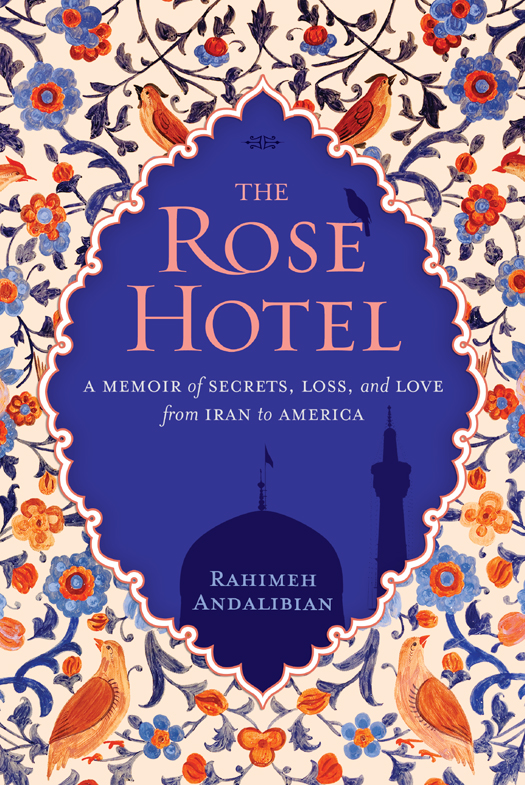
The Rose Hotel
A Memoir of Loss and Renewal from Iran to America
کتاب های مرتبط
- اطلاعات
- نقد و بررسی
- دیدگاه کاربران
نقد و بررسی

Starred review from December 24, 2012
Clinical psychologist Andalibianâs âtrue-life novelâ is a dramatic chronicling of her family escapades during the 1979 Iranian revolution. Born the day her stern and religious father opened the Rose Hotel, Andalibian enjoys the fruits of her familyâs wealth. Joined by her four brothers, Hadi, Zain, Iman, and the eldest, Abdollah, their idyllic life together is meandering yet meaningful. But when rapists begin terrorizing the village, her father is charged with capturing the criminals, whom he must hold on his hotel grounds. Then Abdollah is accused of a crime and disappears. Though Andalibianâs father uproots the family to Tehran and then London, the whereabouts of Abdollah remain a mystery, and the family must move forward. Andalibianâs multilayered tale flows easily and is beautifully steeped in culture and Iranian history. The author has created an ornately imagined tapestry of her personal historyâfilling in the blanks with the kind of creative license reserved for authors who have been there and lived through it.

February 15, 2015
A New York-based clinical psychologist tells the moving story of the life-changing trauma she and her family suffered as a result of the Iranian Revolution of 1979.For the first four years of her life, Andalibian grew up in the protected space of her family and the Rose Hotel, a luxury guesthouse her father ran for pilgrims on their way to the holy city of Mashhad. Everything changed in late 1978 when her father became entangled in a web of religious and political intrigue involving a woman and her two teenage rapists. The new regime of Ayatollah Khomeini promised a fresh start to what everyone believed would be a more just society. Then Iranian courts charged-and later executed-Andalibian's oldest brother, Abdollah, for a crime he didn't commit. To protect the family, her parents told their remaining children that he had gone to America to study; yet the lie did nothing to stop the family from moving into a dark spiral of despair. In the difficult years that followed, the Andalibians moved away from their beloved Rose Hotel. Later, a health crisis forced the author's mother to seek medical care in London and forced a long period of separation between the author and two brothers. Even after the family reunited and then immigrated a second time to Southern California, memories of their old life in Iran and of Abdollah's "disappearance" continued to haunt them. Her parents, especially her devout Muslim father, were adrift in a Western society they could neither entirely accept nor understand, while alcoholism, drug abuse, divorce and undiagnosed mental illness plagued their children. Through a fierce love that was often tested beyond its limits, Andalibian helped her family understand the necessity of revealing long-held secrets and accepting each other's foibles and vulnerabilities. Only then could they finally emerge, scarred but whole, "from its shadows." A powerful and uplifting memoir of tragedy and healing.

Starred review from June 1, 2015
For Andalibian, there is a before and an after: the pleasant naivete she experienced as a child under the Shah's rule, and the years following the Islamic Revolution, when long-hidden secrets threatened to unravel her family. The author's beloved father, Baba, owns and operates a hotel close to a Muslim pilgrimage site in Mashhad, where he raises her and her four siblings. When two young men in town are accused of a grisly crime, Baba shelters them in the hotel, hoping to reform them through prayer and chores until they can be tried fairly under the regime's new court of law. But the men end up implicating the author's 15-year-old brother in a crime punishable by execution. The family deals with the accusation as best they can but soon grow distrustful of the new ayatollah and flee to London and then Southern California for a fresh start. In their new life as immigrants, the family struggles as alcoholism, drug abuse, and infidelity threaten to tear them apart. VERDICT Andalibian's story provides a sweeping chronicle of life in Iran following the revolution and how the aftermath of a political uprising affected one family in a profound way. [See Memoir, 4/15/15; ow.ly/MBDf6.]--ES
Copyright 2015 Library Journal, LLC Used with permission.

April 15, 2015
Abdollah was just 15 years old when he was thrown into prison, accused of murder. It was the early days of the Islamic Republic in Iran, and the country was still experiencing seismic shocks from the 1979 revolution. In this powerful memoir, Andalibian recounts how her brother Adbollah's imprisonment reverberated throughout the family. The knowledge kept by their parents about what happened to Abdollah festered in the lives of Andalibian and her three remaining brothers for years, after the family left Iran and started a new life in California. Andalibian recounts with tenderness and understanding the conflicts facing her parents, the religious father who ran a hotel for pilgrims and the loving mother who gave them both physical and emotional sustenance. The book's beginnings as a true-life novel are apparent in the emotionally explosive scenes that propel the plot forward. Spanning decades and countries, the story derives its impact by remaining single-mindedly focused on this family, their struggles and secrets tightly woven together to form a single, poignant tapestry. Pair this with Jazmin Darznik's The Good Daughter (2011), also about a young Iranian woman coming to terms with her family's history.(Reprinted with permission of Booklist, copyright 2015, American Library Association.)

























دیدگاه کاربران